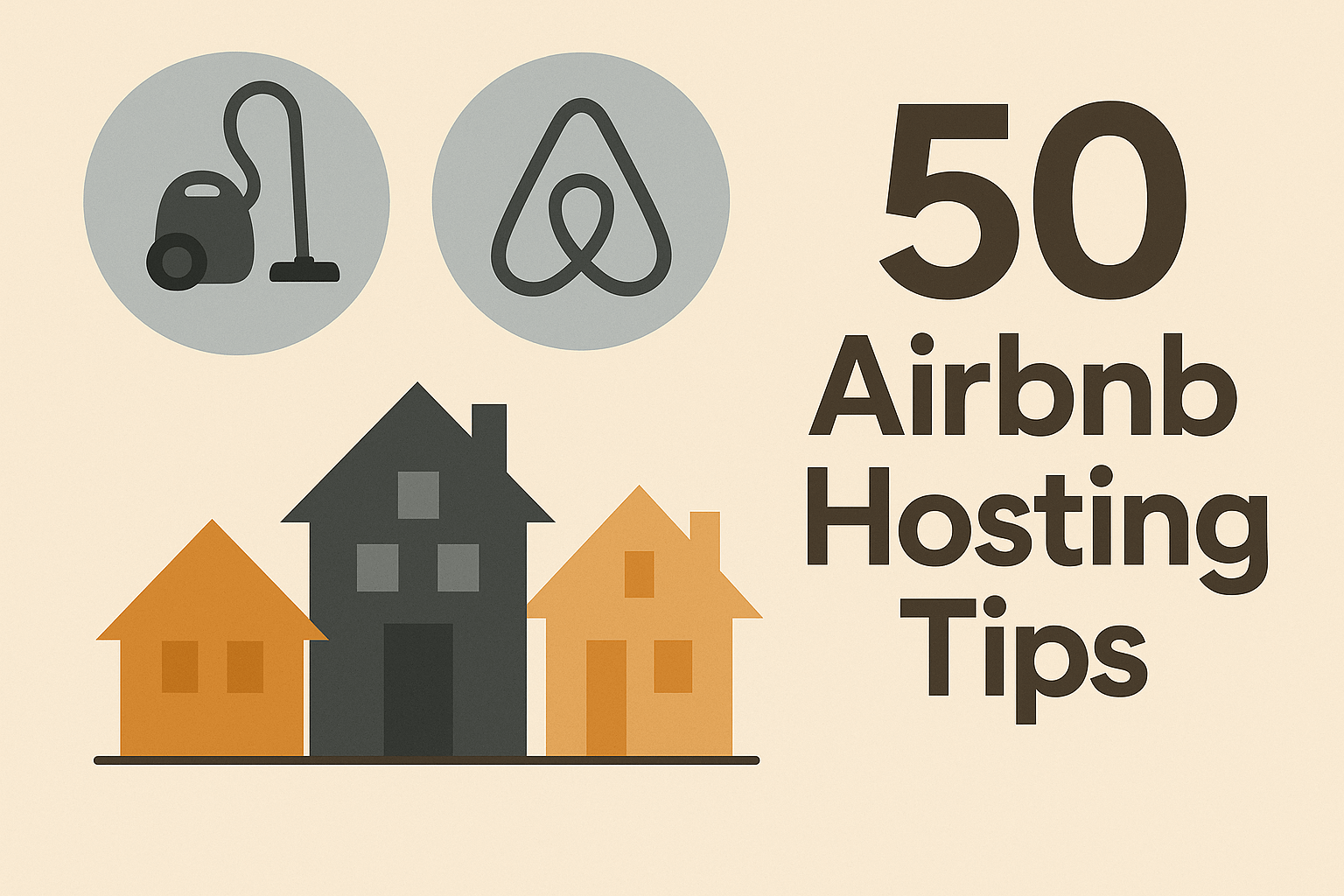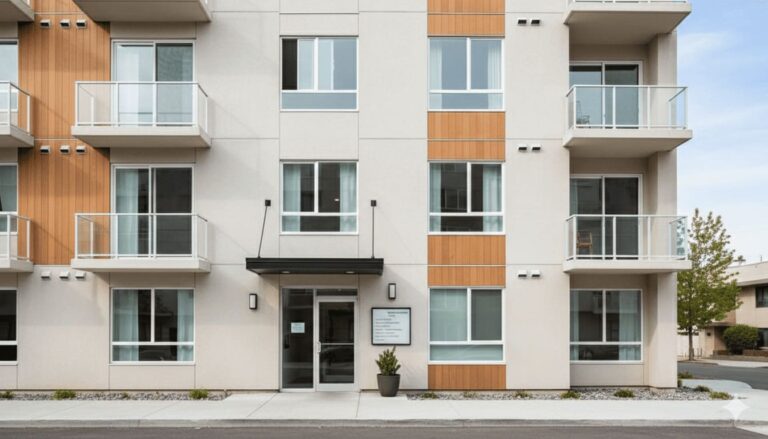Airbnb hosting is more than listing a property online. It involves preparation, consistent management, and understanding how the platform works. This guide breaks down 50 essential tips to help new hosts navigate the process in 2025.
Each section focuses on a different part of hosting—from setting up your space to scaling your business. Whether you’re listing a spare room or an entire home, this resource covers the key areas that affect guest experience, visibility, and long-term success.
What Makes a Successful Airbnb Host
Successful Airbnb hosts understand their property’s value and prepare it properly for guests. Before listing a property, evaluate what makes it suitable for short-term rentals. Consider the location, nearby attractions, and unique features that might appeal to travelers.
The initial investment for hosting includes furniture, bedding, kitchen essentials, cleaning supplies, and photography. Ongoing costs cover utilities, restocking, and regular cleaning between stays.
Local regulations affect who can host on Airbnb. Many cities have specific rules about short-term rentals, including:
- Permit requirements
- Tax obligations
- Zoning restrictions
- HOA or building rules
To start hosting, create an Airbnb account and complete the verification process. This includes providing photo ID and contact information. Once verified, prepare your space to meet Airbnb’s basic standards for cleanliness and safety.
Creating a Standout Airbnb Listing
Airbnb uses an algorithm to determine which listings appear first in search results. Several factors influence this ranking:
- Listing quality: Clear photos and detailed descriptions
- Guest reviews: Overall rating and number of reviews
- Host responsiveness: How quickly you answer messages
- Booking acceptance rate: How often you accept reservation requests
Taking Professional-Quality Photos
High-quality images make a significant difference in booking rates. Professional photos capture lighting and space in ways that phone cameras often miss.
Before taking photos:
- Remove personal items and clutter
- Open curtains to use natural light
- Add fresh flowers or plants
- Arrange furniture to show room flow
Include images of all rooms, with special focus on:
- Living areas
- Bedrooms
- Bathroom(s)
- Kitchen
- Outdoor spaces
- Special amenities (hot tub, fireplace, etc.)
Writing an Effective Title and Description
Your listing title should follow this simple formula: [Unique Feature] + [Property Type] + [Location/Benefit]
Examples:
- “Sunny Loft with Mountain Views Near Downtown”
- “Cozy Cabin Retreat | Hot Tub | Private Trail Access”
The description provides more details about what guests can expect. Use bullet points to highlight:
- Number of bedrooms and bathrooms
- Special amenities (WiFi speed, kitchen equipment)
- Proximity to attractions
- House rules
Include relevant keywords like “airbnb host tips” or “airbnb hosting guide” naturally in your description to improve visibility.
Using Airbnb’s Tag System
Airbnb allows hosts to select tags that describe their property. These tags help match your listing with guests’ search filters.
Common tags that improve visibility:
- Family-friendly
- Pet-friendly
- Business-ready
- Free parking
- Fast WiFi
- Self check-in
- Near downtown
- Ocean view
Setting Up Easy Check-In Processes
The check-in experience sets the tone for a guest’s entire stay. Clear communication before arrival reduces confusion and helps guests feel welcome.
Pre-Arrival Communication
Send a message 24-48 hours before check-in with essential information:
- Property address and directions
- Parking instructions
- Entry codes or key location
- WiFi password
- Your contact information
A simple template might read:
“Hi [Guest Name], I’m looking forward to hosting you tomorrow! Here’s everything you need for a smooth arrival: [address, parking details, entry instructions]. The WiFi password is [password]. Please message me if you have any questions!”
Self Check-In Options
Self check-in allows guests to arrive at their convenience without needing to meet you in person. Common methods include:
| Method | How It Works | Approximate Cost | Pros | Cons |
|---|---|---|---|---|
| Lockbox | Key stored in combination box | $15-$50 | Affordable, simple | Manual key management |
| Smart Lock | Digital lock with codes | $100-$300 | No physical keys, code changes | Requires batteries/power |
| Keypad | Numeric code entry | $50-$200 | No app needed | Limited code options |
Include clear photos or a short video showing exactly how to access the property with your chosen method.
Welcome Touches
Small welcome items create a positive first impression:
- Bottled water
- Local snacks
- Simple welcome note
- Basic toiletries
- Coffee/tea station
These touches don’t need to be expensive but show thoughtfulness and attention to detail.
Smart Pricing Strategies
Setting the right price affects both your occupancy rate and overall income. Several approaches help maximize revenue without sacrificing bookings.
Using Dynamic Pricing Tools
Dynamic pricing tools automatically adjust your nightly rates based on:
- Local events and holidays
- Seasonal demand
- Competitor pricing
- Day of the week
Popular tools include:
- PriceLabs
- Beyond
- Wheelhouse
These services typically charge a monthly fee or percentage of bookings but often increase overall revenue by 15-20%.
Seasonal Price Adjustments
Different seasons affect demand for your property. A basic formula for seasonal pricing:
Base Rate × Seasonal Multiplier = Adjusted Rate
Example seasonal multipliers:
- Peak season: 1.2-1.5× base rate
- Shoulder season: 1× base rate
- Off-season: 0.7-0.9× base rate
Research local events that might increase demand, such as:
- Festivals and concerts
- Sporting events
- Graduation weekends
- Holidays
Offering Discounts for Longer Stays
Longer stays reduce turnover costs and vacancy periods. Common discount levels:
- Weekly stays (7+ nights): 10-15% discount
- Monthly stays (28+ nights): 20-30% discount
Adjust these based on your location type:
- Urban properties: Lower discounts (higher demand)
- Rural properties: Higher discounts (lower turnover costs valuable)
Safety and Legal Requirements
Operating an Airbnb involves legal responsibilities and safety considerations. Understanding these requirements helps protect both you and your guests.
Creating Clear House Rules
House rules set expectations and boundaries. Basic rules typically include:
- No smoking
- No parties or events
- Quiet hours (e.g., 10pm-8am)
- Maximum guest count
- Pet policy
List these rules clearly in your listing description so guests see them before booking. Airbnb’s platform allows you to add standard rules and create custom ones.
Review guest profiles and past reviews before accepting bookings. Look for verified profiles and positive feedback from other hosts.
Understanding Local Regulations
Short-term rental rules vary widely by location. Research your local requirements by:
- Checking city/county websites
- Contacting the local housing department
- Joining host community groups
Common requirements include:
- Business license
- Short-term rental permit
- Tax registration
- Safety inspections
- Occupancy limits
Some cities limit the number of nights you can rent your property or restrict rentals to primary residences only.
Insurance Coverage
Airbnb provides two basic protection programs:
Airbnb Host Guarantee: Covers property damage caused by guests up to $1 million
Airbnb Host Protection Insurance: Provides liability coverage if guests are injured
These programs have limitations and exclusions. Consider additional coverage:
- Short-term rental insurance
- Umbrella liability policy
- Business insurance
Contact insurance providers who specialize in vacation rentals for quotes.
Maintaining Five-Star Reviews
Reviews directly impact your listing’s visibility and booking rate. Guests rate their stay on a five-star scale, with factors including accuracy, cleanliness, communication, and overall experience.
Essential Amenities Guests Expect
Modern travelers expect certain basics in every rental:
- Fast, reliable WiFi
- Quality bedding and towels
- Coffee maker and basic supplies
- Toiletries (shampoo, soap)
- Hair dryer
- Iron and ironing board
- TV with streaming capabilities
Beyond these basics, consider thoughtful extras:
- Local guidebook with recommendations
- Board games or books
- Welcome basket with snacks
- Extra phone chargers
- Basic cooking supplies
Responding to Guest Feedback
After checkout, both you and your guests can leave reviews. Respond to all reviews professionally:
For positive reviews: “Thank you for your kind words! I’m so glad you enjoyed your stay and would love to host you again.”
For negative reviews: “Thank you for your feedback. I appreciate you bringing these issues to my attention and have already taken steps to address them.”
Use criticism constructively to improve your listing and prevent similar issues in the future.
Cleaning and Maintenance Standards
Cleanliness consistently ranks as the most important factor in guest reviews. Create a thorough cleaning checklist:
- Change all linens and towels
- Disinfect all surfaces, especially in kitchen and bathroom
- Clean floors, vacuum carpets
- Check and restock supplies
- Empty all trash
- Test all appliances and electronics
Schedule regular maintenance checks:
- Monthly: Deep clean, check for wear and tear
- Quarterly: Appliance maintenance, HVAC filters
- Annually: Safety equipment, larger repairs
Using Technology to Save Time
Technology tools help manage properties more efficiently, reducing manual work and improving the guest experience.
Automated Messaging
Automated messaging tools send pre-written messages at specific times:
- Booking confirmation
- Pre-arrival information (7 days before)
- Check-in instructions (day before)
- Mid-stay check-in (for longer stays)
- Check-out reminder
- Review request
Popular automation tools include:
- Hospitable
- Smartbnb
- Guesty
These tools save hours of repetitive communication while maintaining a personal touch.
Smart Home Devices
Smart home technology improves security and convenience:
- Smart locks for keyless entry
- Video doorbells for monitoring arrivals
- Noise monitors to prevent parties
- Smart thermostats for energy efficiency
- WiFi plugs for remote control
Budget-friendly options include Wyze cameras, August smart locks, and TP-Link smart plugs, all under $100.
Performance Tracking
Track key metrics to evaluate your listing’s performance:
- Occupancy rate (target: 70%+)
- Average nightly rate
- Revenue per available night
- Review score average
- Response rate and time
Compare these metrics month-to-month and against similar properties in your area to identify improvement opportunities.
FAQs About Airbnb Hosting
What is the 90-day rule for Airbnb properties?
The 90-day rule limits short-term rentals to 90 nights per calendar year in specific cities like London and San Francisco. This regulation aims to preserve long-term housing availability. Check your local government website for specific restrictions in your area.
How can I qualify for Superhost status on Airbnb?
To become a Superhost, you need to host at least 10 stays totaling 100 nights within a year, maintain a 4.8+ rating, respond to 90% of messages within 24 hours, and keep cancellations below 1%. Airbnb reviews these criteria quarterly.
What insurance coverage do I need beyond Airbnb’s protection?
While Airbnb provides basic coverage, most hosts benefit from additional short-term rental insurance that covers liability, property damage, theft, and loss of income not included in Airbnb’s programs. Contact insurance providers specializing in vacation rentals for specific policy options.
How can I make my Airbnb property stand out from competitors?
Create a distinctive property by highlighting unique features, using professional photography, offering special amenities not commonly found in your area, and providing exceptional communication. Personal touches like local recommendations and welcome gifts also help create memorable experiences that lead to positive reviews.
What cleaning protocols are required for Airbnb properties?
Airbnb expects thorough cleaning between guests, including disinfecting high-touch surfaces, changing all linens, and ensuring all amenities are functional. During health concerns, enhanced protocols may be required. Providing cleaning supplies for guests during their stay is also recommended.



